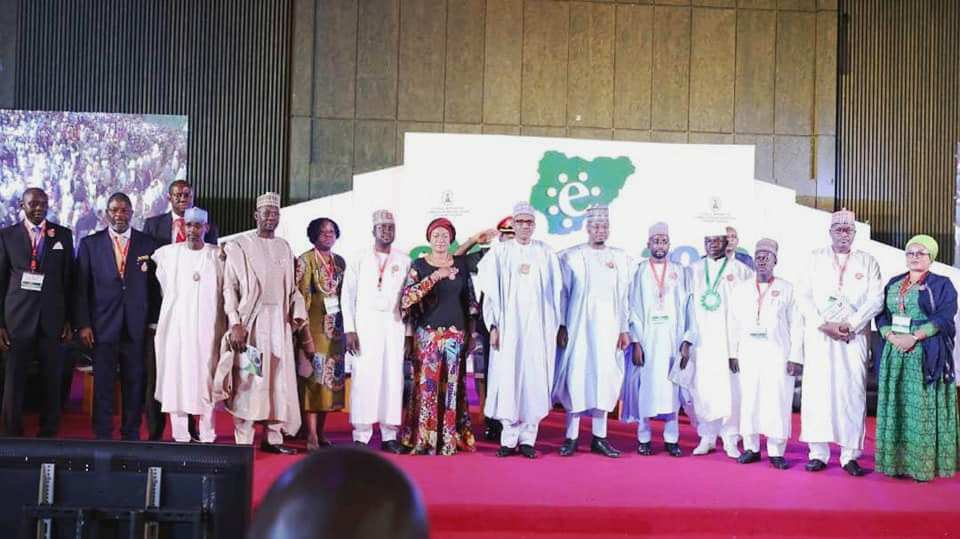By Nwakaeago Alajemba
Nigeria’s Minister of Communications and Digital Economy, Dr Isa Ali Ibrahim Pantami has appealed for greater synergy among stakeholders in the ICT sector to help drive government’s agenda for the digital economy.
While speaking on Thursday at the eNigeria conference, exhibitions and awards in Abuja, he said the vision to achieve a digital Nigeria by 2023 was practicable only if stakeholders collaborated and join the common goal for a National Digital Economy for a Digital Nigeria.
“The first thing we did under the Federal Ministry of Communications was to bring synergy and establish a pragmatic team. ICT has converged today so all stakeholders must converge with the aim of supporting one another in order to take the country to higher levels when it come to ICT,” said Pantami while taking stock of mandate as the Minister of Communications and Digital Economy.
He said the initial task at building synergy within all the parastatals under his ministry as well as other key stakeholders agencies has paid off with a hifher sense of harmony to driving government’s goals.
Synergy is critical to achieving any objective, said Pantami explaining why for the first time he ensured that the eNigeria conference is hosted jointly by all the agencies under his ministry. “This is a demonstration of the unity and synergy, without which it is absolutely difficult to achieve anything,” he added.
The eNigeria event is the flagship conference of the NITDA. The two-day event with the theme: ‘National Digital Economy’ was declared open by President Muhammadu Buhari.The chief host and convener for eNigeria 2019 is the Minister of Communications and Digital Economy, Dr Pantami while the event’s host and convener is NITDA’s Director-General/Chief Executive Officer, Mr. Kashifu Inuwa Abdullahi.
For the first time, all heads and CEOs of agencies under the ministry are co-hosts and co-conveners. They include the EVC of Nigerian Communications Commission (NCC), Prof Umar Danbatta; CEO of Nigocmsat, Ms Abimbola Alale; CEO of Galaxy Backbone Limited, Mr. Yusuf Kazaure; and Post Master General/CEO of NIPOST, Barrister Bisi Adegbuyi.
“We are working on development regulations, digital integration, building solid infrastructure, deployment of digitisation and emerging technologies, as well as local content promotion and we want all hands on deck” – Pantami
Pantami said President Buhari was focused on economy diversification, ensuring security and fighting corruption all of which are depended, for good results, on ICT. In recognition of the role that ICT can play in achieving these goals, the president approved the renaming of the ministry to become the Ministry of Communications and Digital Economy.
“The Federal Government has the plan to deliver to citizens a digitally developed country by the year 2023 and we require that all stakeholders should be part of this growth. “We are working on development regulations, digital integration, building solid infrastructure, deployment of digitisation and emerging technologies, as well as local content promotion and we want all hands on deck,” said Pantami
For the NITDA’s boss, Abdullahi, no economy can function without going digital and national goals may remain elusive with a strategic plan for digitalization. His words: “Digital Economy not only change the way business performs, it also change how countries function. Government around the world are investing heavily on improving their Digital Economy and capability to augment value creation and prosperity.”
Right policy for investors – Opeke
In her keynote speech, the Chief Executive Officer of MainOne, Ms Funke Opeke, tasked on the need at evolving right policy frameworks to encourage investors. She argued that investment in telecommunications in the past 10 years for digital economy has dropped and needed a boost through incentives.
Her words: “We need proper framework for companies to grow to global scale especially startup companies and we need to be deliberate about our strategy so we are not a consuming nation of technology.”
“Digital Economy not only change the way business performs, it also change how countries function.” – Abdullahi,
She also added that government need to offer policy incentives that would get investors into rural communities. “Services and infrastructure are built in cities which cover less than 50 per cent of our population, leaving the rural areas behind. It is important that the infrastructure spread across the country for even development,” said Opeke while calling for the establishment of digital economy offices in the six geo-political zones of the country to help foster training and job creation to about one million Nigerians every year.
Carrots for indigenous entrepreneurs
Government also needs to drive the framework to encourage indigenous entrepreneurs to grow while also restricting certain fields to only local players for both security and economic reasons. Her words:
“Most countries do not allow foreign businesses play in certain areas of their economy because indigenous companies need to create local jobs. We have examples form petty trading in Ghana to supermarkets in India and data centres in China.
“When data bases of critical importance to Nigerian citizens such as identity and government accounts are hosted offshore, our country faces inherent risks. We are simply sending too much of our proprietary information, our skills and even our start-up ventures abroad and we need to do more to retain our collective wisdom here.
“When data bases of critical importance to Nigerian citizens such as identity and government accounts are hosted offshore, our country faces inherent risks” – Opeke
“In this virtual world, where almost any service in Nigeria can be delivered form offshore, we need to be deliberate about our strategy so as not to remain simply consumers of technology. We need to encourage global players to domesticate technology platforms here in our country and create jobs if they want to play. We need these players to collaborate and invest in our economy to get a return, not simply to extract value.”
Additional report by the News Agency of Nigeria (NAN)
































